Manually replying to every Facebook comment is time-consuming and complicated to scale, especially if you manage multiple pages or clients. When replies are delayed or inconsistent, you miss out on potential leads, lower engagement, and hurt your brand’s credibility. That’s why many agency owners and small business marketers now automate Facebook comment replies using AI.
This speeds up responses while also ensuring they remain relevant and human-like.
In this blog, you’ll learn;
- How to automate Facebook comment replies without sounding robotic
- How to set up auto-reply for Facebook comments using SocialBu
- How to fix the challenges of Facebook Auto-Reply Tools
Stay with us to simplify your comment management and enhance your response capabilities.
Why Automate Facebook Comment Replies in 2025
If you have a business page on Facebook, then you know how important it is to stay active and responsive there. According to Backlinko, 89% of customers expect a response from businesses to their online reviews or comments. Failing to respond to customer comments or delaying your response can harm your credibility.
That’s why now businesses prefer to automate Facebook comment replies. When AI Facebook comment reply automation is a thing, then why not take advantage of it?
Auto-reply to Facebook comments ensures your brand remains active, even when you’re offline.
Here are some benefits that automated Facebook comment responses offer to you.
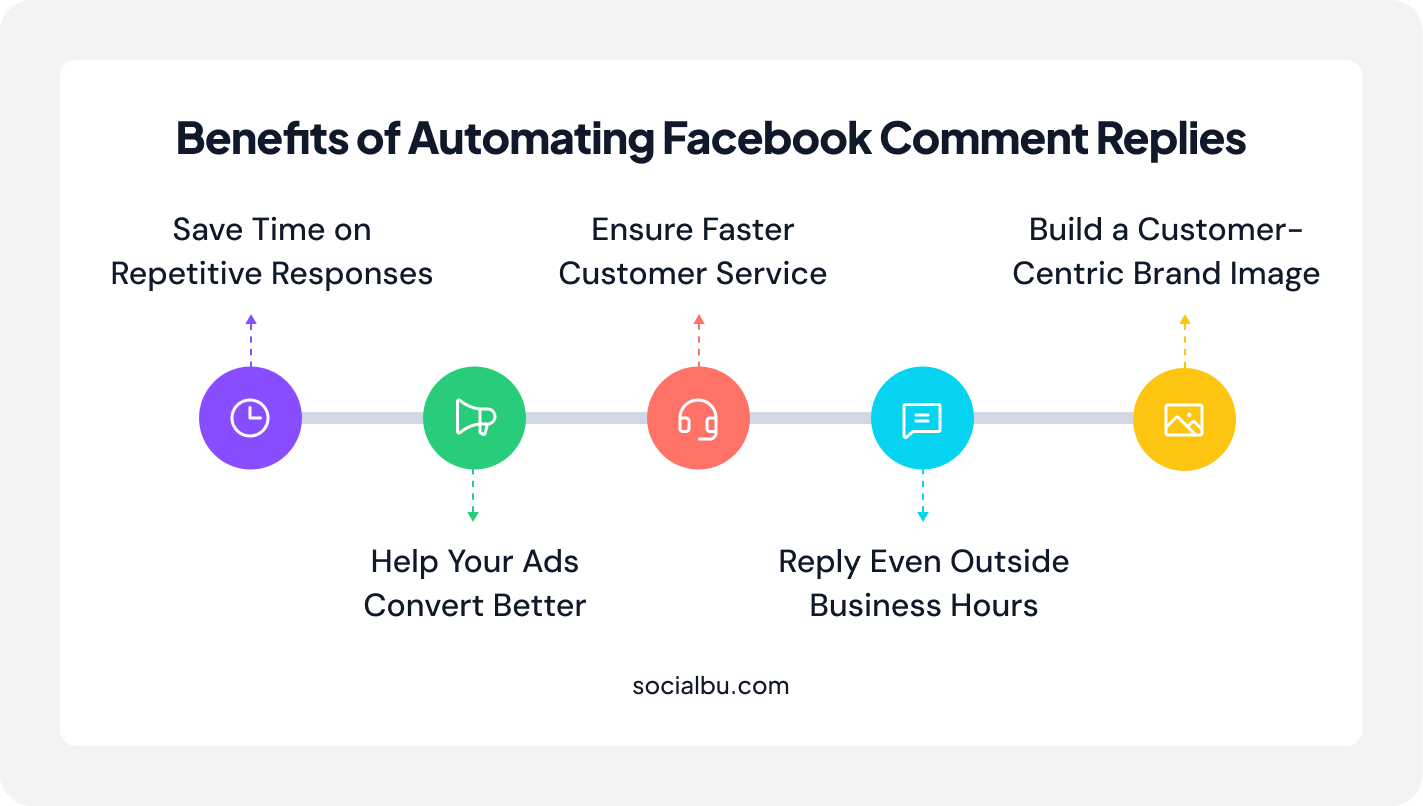
1. Save Time on Repetitive Responses
As a brand or freelancer, you receive repeated questions, such as product availability, pricing, and support hours. Manually answering these can take several hours a day.
Automating responses to common queries saves you valuable time while keeping your audience engaged. Instead of copying and pasting the same message, you can set predefined replies that trigger based on specific keywords.
With automated comment replies, you can:
- Handle multiple conversations at once
- Keep your comment section organized
- Focus your time on high-priority issues
This automation enables small teams to scale their efforts without compromising responsiveness.
2. Ensure Faster Customer Service
Today’s customers expect near-instant replies on social platforms. When their comments are left unanswered, it affects your response rate and your credibility.
With auto-reply to Facebook comments, you can ensure every question, concern, or compliment is acknowledged quickly, even during peak hours.
Automated responses to Facebook comments act as the first layer of customer support. You can provide helpful information right away, route users to your DMs, or let them know when to expect a detailed response. This makes your audience feel heard and valued.
3. Build a Customer-Centric Brand Image
When people see that you’re active in the comment section, it builds trust. Even automated responses show that you’re paying attention. Brands that reply consistently are more likely to create a community around their content. It signals reliability and a willingness to engage.
Moreover, interacting with your audience creates a feedback loop. You gain insights into what they like, dislike, or need. This helps you refine your content strategy.
All of this contributes to boosted Facebook engagement and builds your brand as approachable and responsive.
4. Help Your Ads Convert Better
You can’t afford to ignore comments on Facebook ads. These are often leads or curious prospects who engage with your content and raise questions.
Ignoring or delaying responses here can affect how people perceive your ad and reduce its conversion potential. Automating replies to ad comments ensures that you capture interest when it’s at its peak.
When you respond promptly to comments on ads, you make your brand appear more accessible and trustworthy. It also gives you a chance to clarify any confusion or encourage the commenter to take the next step, this could be;
- Visiting your site/profile
- Browse the products
- Encourage them to make a purchase
For better ROAS (return on ad spend), timely replies can make a measurable difference.
5. Reply Even Outside Business Hours
Social media is 24/7, but let’s accept it, your team isn’t as they’re humans. Automation fills this gap by keeping your pages active and responsive around the clock, ensuring they remain accessible and responsive at all times.
Even when you’re offline, you can still maintain engagement and offer assistance with AI-powered comment responses. This is especially helpful during weekends, holidays, or late hours.
You can automate friendly messages that acknowledge the comment, offer links to helpful resources, or invite users to message you directly. It shows users that you’re attentive and available, no matter the time.
Now, let’s look at the step-by-step process of how to automate Facebook comment replies using AI.
How to Automate Facebook Comment Replies with SocialBu: Step-by-Step
Several tools are available today to automate Facebook comment replies, including options such as ManyChat, NapoleonCat, and Statusbrew. But most tools either lack personalization or come with a steep learning curve.
So, let’s introduce you to SocialBu. It’s an all-in-one social media management platform built to help agencies, marketers, and businesses automate their workflows, save time, and increase online engagement.
It supports everything from content scheduling to automated customer interaction. One of its key features is automated Facebook comment replies for business pages, which allow you to engage with your audience without missing a beat.
Using SocialBu’s automation feature, you can easily set up Facebook comment auto-reply tools that respond to specific comments, keywords, or triggers. This ensures that every comment on your Facebook posts receives timely and relevant engagement, without sounding robotic.
Here’s how you can automate Facebook comment replies using AI with SocialBu:
Step 1: Log in to SocialBu
Sign in to your SocialBu account. If you don’t have one yet, sign up for free at socialbu.com to access automation tools for Facebook.
Step 2: Go to “Automation”
From the left-side menu, click on “Automation”. This is where you can create rules to auto-reply to Facebook comments based on custom triggers.
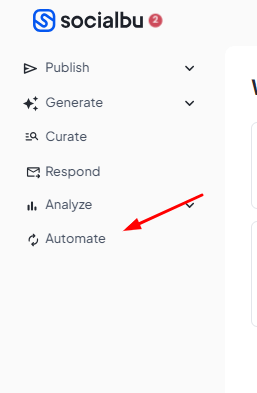
Step 3: Click “Create Automation”
Click on “+ New Automation” at the top right corner to start building your rule.
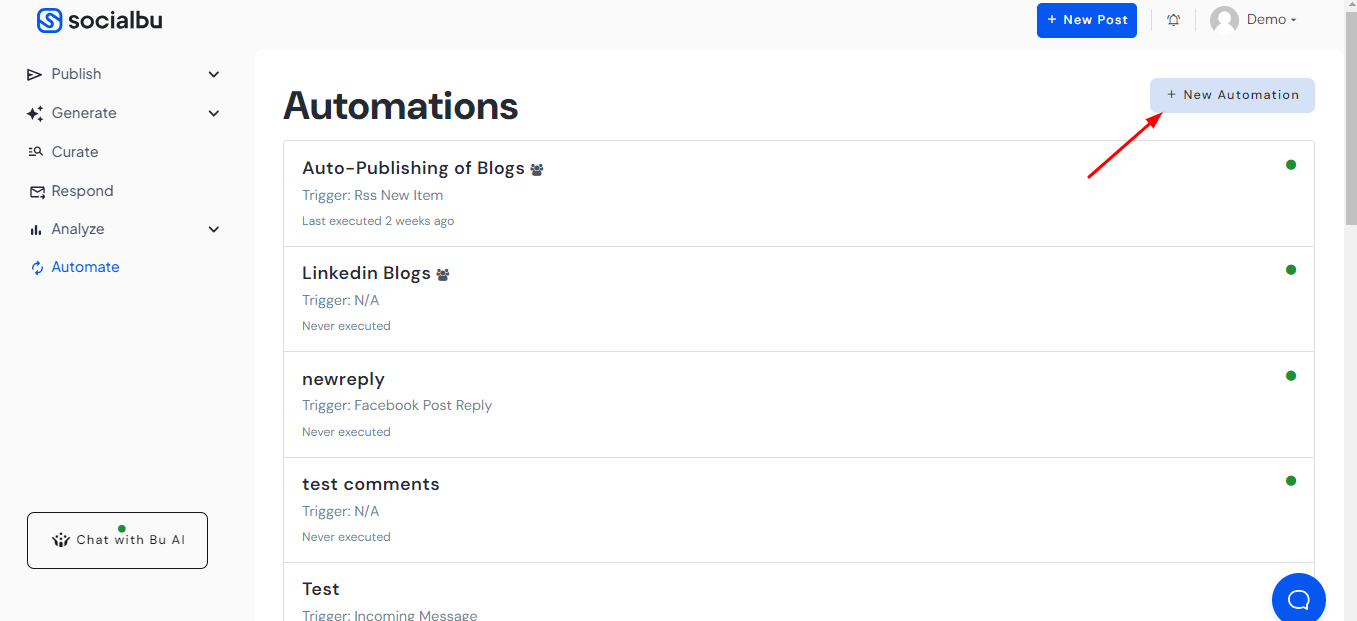
A pop-up will appear, asking you to name your automation. So, give your automation a descriptive name (e.g., “Auto-reply to promo post comments or Responding to comments on X post”). Save the name and click on Next to continue.
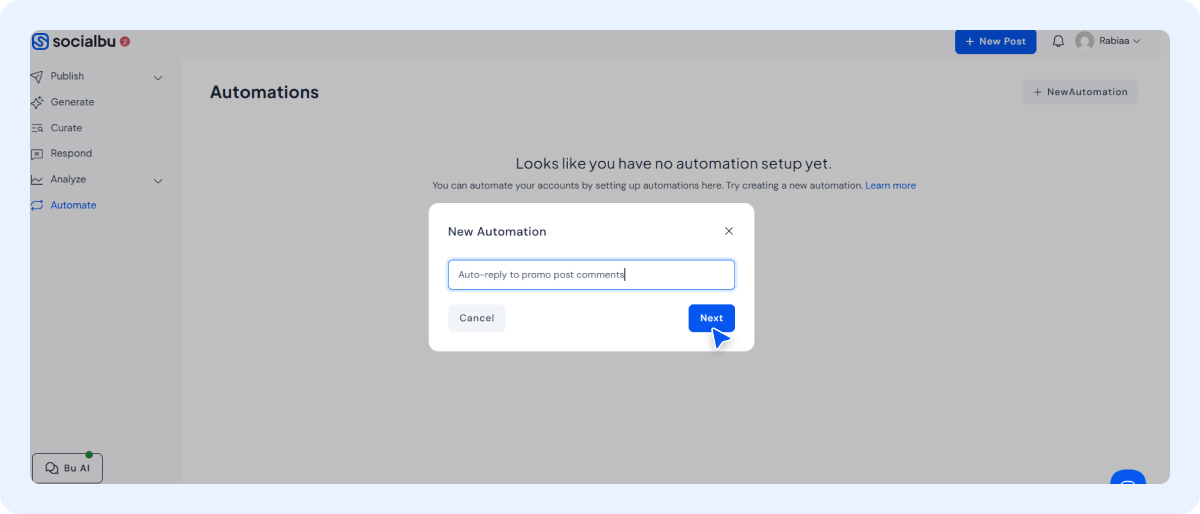
After you have successfully created your Automation, this page will appear. The next few steps will help you understand each functionality available on this page.
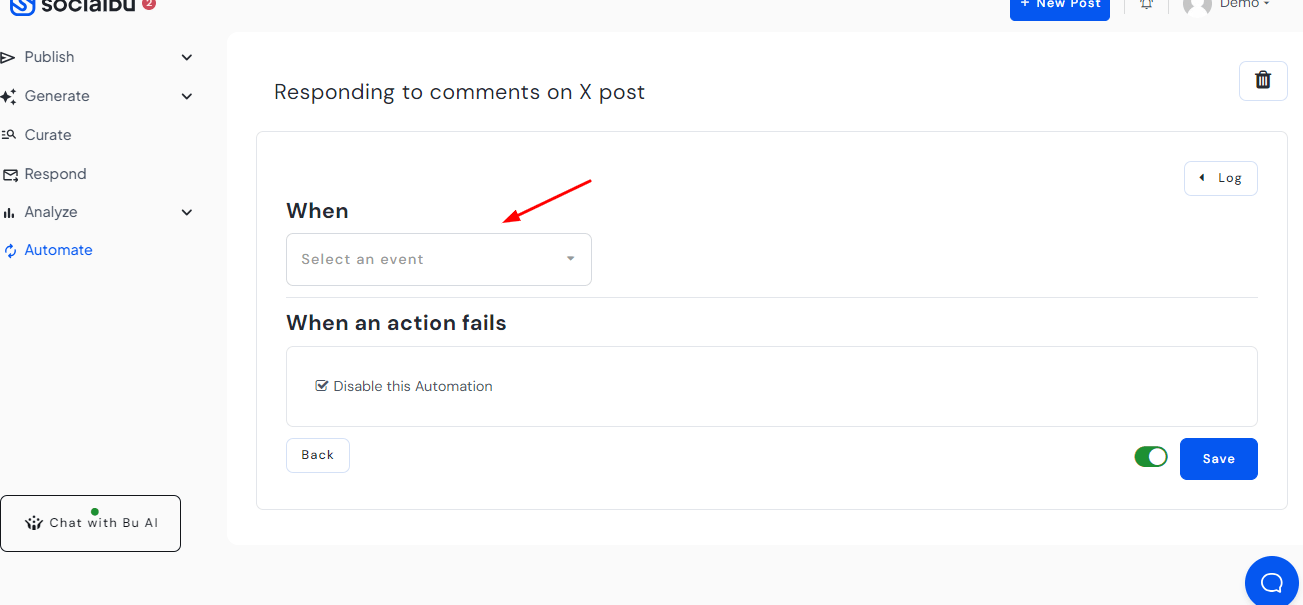
Step 4: Set the Trigger
Under the trigger section,
Click on “When” to select an event when you want the automation to perform. Here, you will see various event options available in the drop-down menu. Select the event and click ‘Save’.
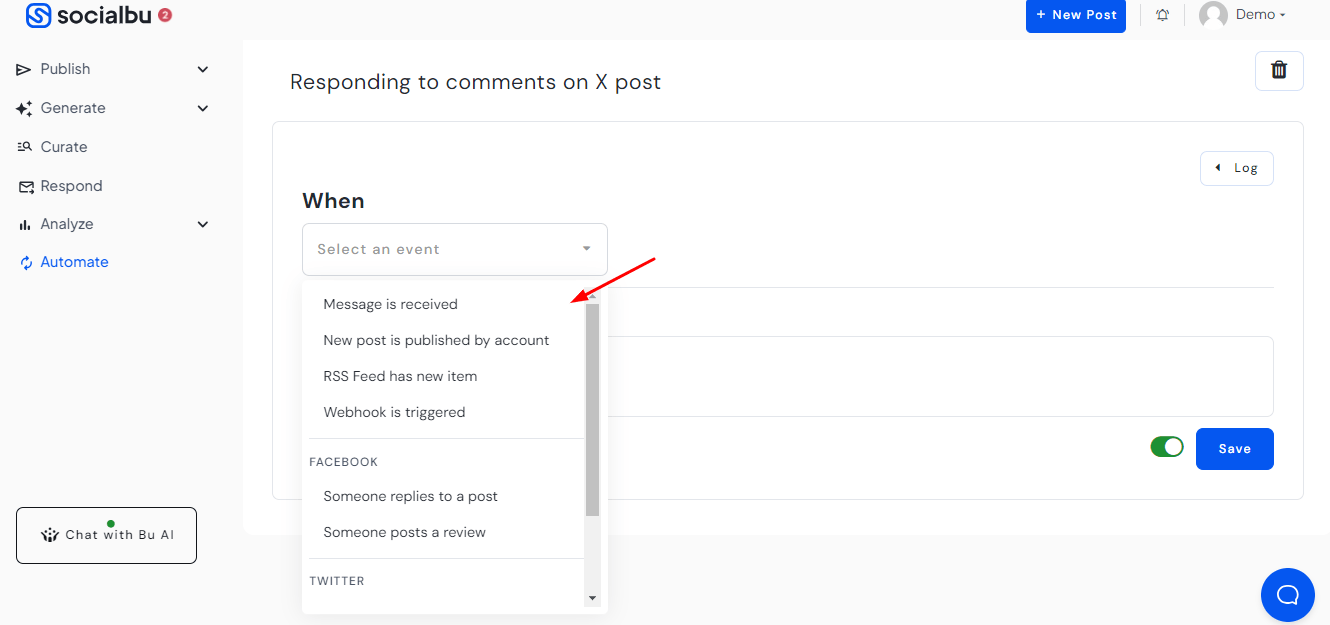
Here, you also have to select and attach your social media account for the automation.
Next, it’s time to decide on the actions for this event or automation.
Here, the action will be “Send Reply” to reply to the comments on your Facebook post.
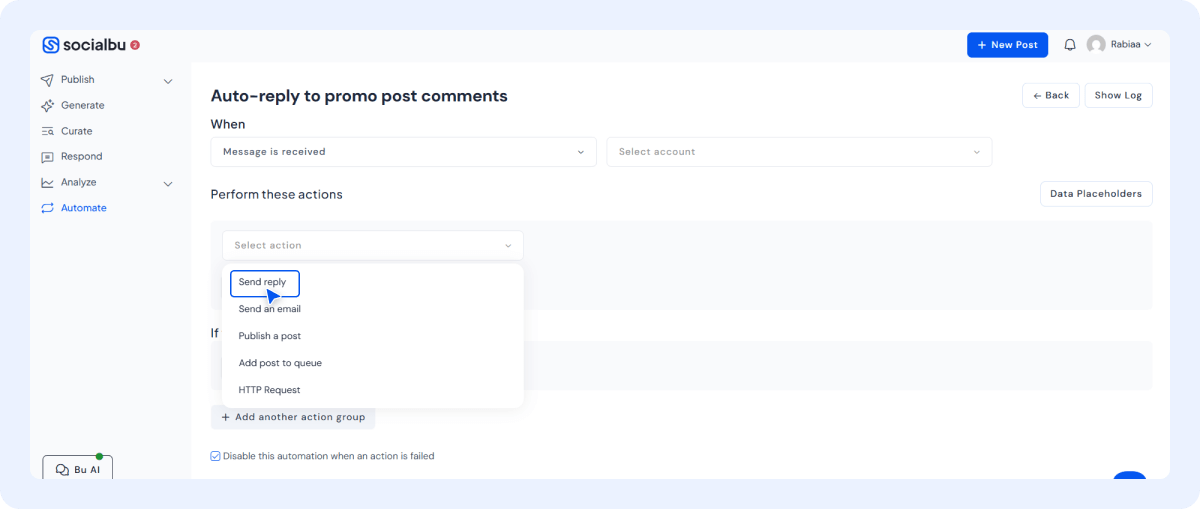
After that, a small content tab will appear where you have to add the message you want to send to the users, along with the commenter’s first name.
Pro Tip:
Here, you can also limit your automation to be executed only when some conditions are satisfied.
For that, you can add conditions by clicking on the ‘Add Condition’.
For example, suppose you want to respond only to a specific comment containing a particular keyword. In that case, you can set a condition to filter the comments that our system should respond to.
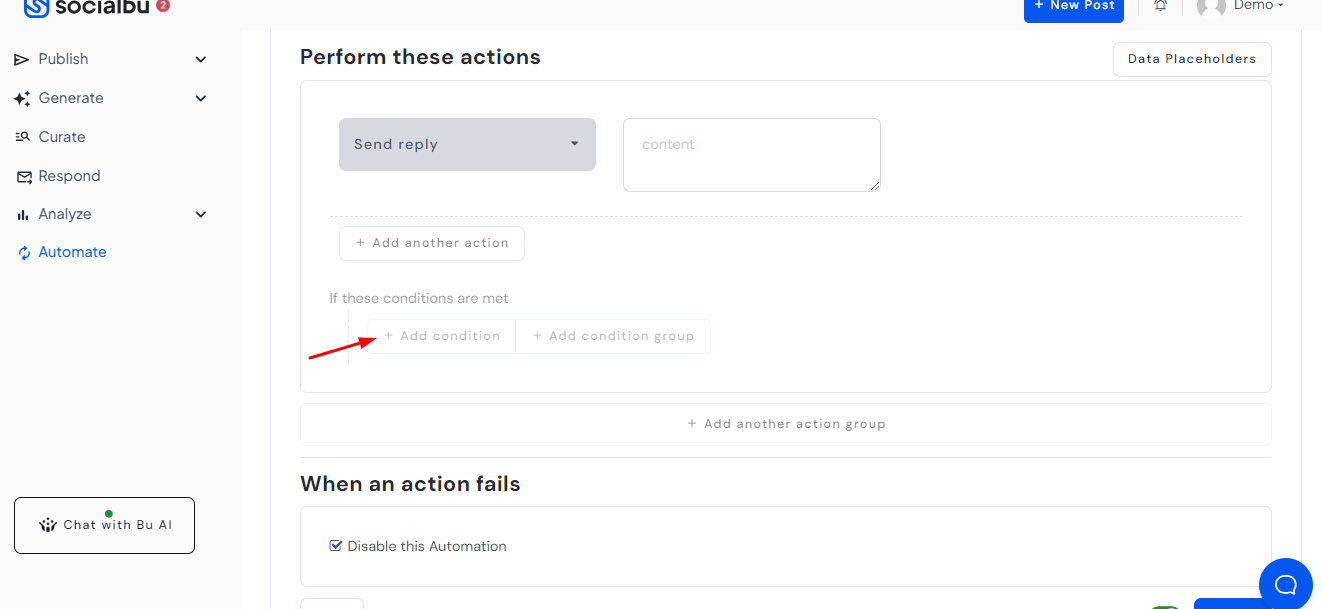
Here are the operators that will appear in the drop-down menu.
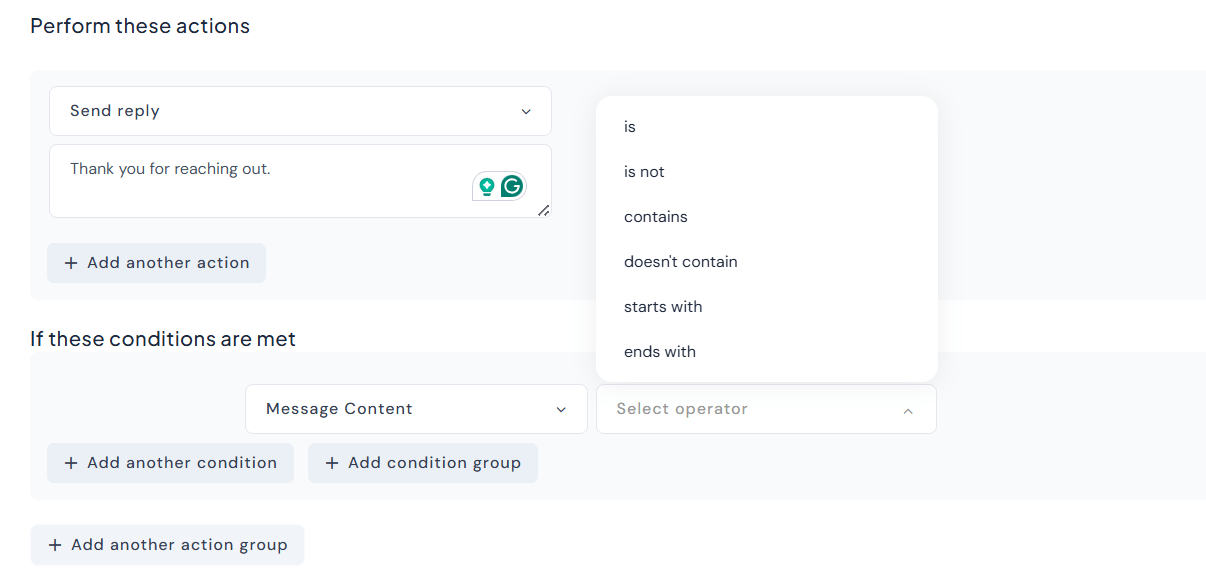
This is where the auto-reply triggers begin their job.
Step 5: Add Filters (Optional but Recommended)
Use filters to refine how the automation works.
You can filter by:
- Keywords: (great for keyword-based responses)
- Commenter’s name or type
- Sentiment: (positive, negative, or neutral)
- Add emojis or friendly phrases to avoid robotic tones.
This is how SocialBu helps with Facebook comment reply personalization, avoiding generic responses.
Step 6: Save and Activate
Once everything looks good, click “Save” and toggle the automation ON. SocialBu will now monitor and respond to comments based on your settings. This gives you real-time comment response and continuous engagement, even when you’re offline.
You can also check when your automation has executed by clicking on LOG.
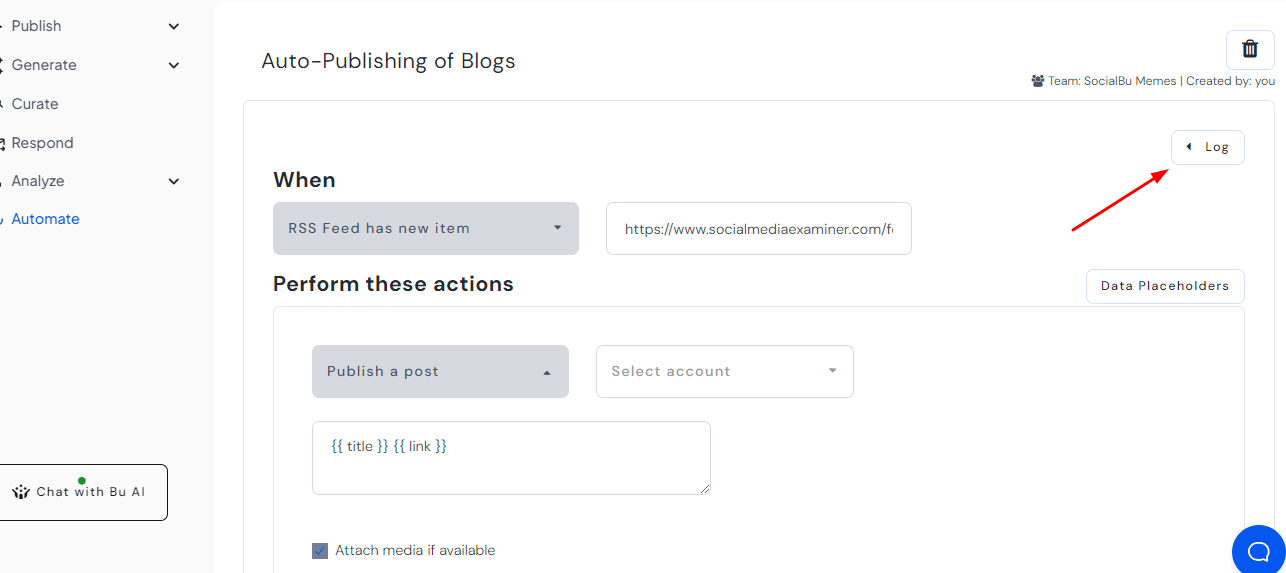
And it’s done.
With SocialBu’s AI-powered comment responses, you have successfully created Facebook comment response automation for your next Facebook post.
Now, you don’t have to worry about missing out on potential leads, slowing down your customer support, or sounding overly automated. It’s a smart way to stay active, responsive, and customer-centric on Facebook—without the daily hassle.
Also Read:
How to Manage Instagram, Facebook, and LinkedIn Comments in One Inbox
How to Manage Instagram, Facebook, and LinkedIn Comments in One Inbox
Therefore, SocialBu is an ideal tool for Facebook engagement automation. Book a demo now!
Challenges of Facebook Auto-Reply Tools (And How to Overcome Them)
Automated responses to Facebook comments may sound easy, and it’s easy. However, if not handled correctly, it can backfire.
The biggest concern? Sounding robotic or irrelevant. Moreover, it’ll ruin your brand image and customer trust.
Here are common issues users face:
- Generic or robotic responses that feel impersonal
- Wrong context replies, especially on emotional or complex comments
- Over-automation, which can annoy your audience
- Hard-to-use tools with complicated setups
- Delayed or missed replies due to poor AI detection
- Spam risks without proper filters
How to Fix These Challenges
With the right tool, such as SocialBu’s Intelligent Replies, you can overcome these issues. You can:
- Personalize replies using the commenter’s name or keywords
- Set auto-reply triggers based on comment type or keywords
- Choose specific posts to enable auto-replies where they make sense.
- Control tone and language to sound human and on-brand
- Engage in real-time, even outside business hours.
Using advanced tools to automate Facebook comment replies, you can keep your replies relevant, timely, and authentic without requiring manual effort.
And what is a better choice than SocialBu – a Facebook comment management software trusted by over 18,000 users.
Best Practices for Non-Robotic Facebook Comment Replies
If you automate Facebook comment replies without careful planning, your responses might come off as cold or generic and sound robotic. In 2025, users expect quick yet human-like interactions, especially on platforms like Facebook, where engagement occurs in real-time.
The overall goal is to automate Facebook comment replies for business pages while maintaining a personal and human-like tone.
Here’s how to set up personalized comment replies on Facebook without sounding robotic:
1. Talk Like a Human
One of the most important things to remember is to use human language in your replies. Avoid stiff, robotic phrases.
Instead, write the way you speak and interact with someone physically.
Emojis can help make your replies feel more natural, especially if they match your brand’s tone. A casual “Thanks! 😊” or “Glad you liked it!” goes a long way in keeping interactions friendly and engaging.
2. Customize Replies by Post Type or Sentiment
Note that not every Facebook post needs the same type of reply. You should tailor your responses based on the content type or the mood of the comment.
For instance, a product-related comment may require a helpful or promotional response, while a compliment may necessitate a simple thank-you. This approach helps maintain relevance and ensures your replies don’t feel out of place.
SocialBu makes this easier with keyword-based responses and auto-reply triggers, allowing your replies to match both post type and sentiment.
3. Regularly Update Response Templates
Templates can save time, but overusing them can make replies feel outdated and impersonal. Facebook comment reply personalization
Review and refresh your Facebook comment auto-responder setup and response templates regularly to ensure they remain up-to-date. Doing this helps your brand stay current and shows your audience that you care enough to keep things up to date.
4. Don’t Over-Automate Sensitive Conversations
Sensitive or negative comments should never be auto-replied with a generic message. In such cases, a human response is much more appropriate. You can configure your settings in SocialBu to exclude specific keywords or phrases from automation, thereby avoiding mishandling delicate situations.
5. Manually Reply When Needed
AI automation can handle volume, but not everything must be automated. It’s essential to monitor your comment section closely and step in when necessary.
Mix manual responses with automation to keep your communication real while still saving time. SocialBu’s intuitive dashboard makes it easy to switch between automated and manual replies with ease.
6. Create Multiple Variants of Your Auto Replies
Facebook comment response automation streamlines your social media management. But note that using the same reply repeatedly can make you sound robotic. To avoid this, create multiple versions of your common responses.
For example:
- “Thanks for your comment!”
- “Appreciate your feedback!”
- “Glad you shared your thoughts!”
SocialBu enables you to rotate random replies, ensuring your responses remain engaging and unpredictable while staying on-brand.
Wrap Up
Let’s face it—replying to every single Facebook comment manually is nearly impossible to scale as your brand grows. However, you can’t afford to ignore these comments, as they negatively impact engagement.
But sounding robotic while replying? That’s just as damaging.
With the proper Facebook comment auto-responder setup, you can respond faster, stay on brand, and engage with your audience 24/7. But the key is to use automation to support—not replace—genuine conversations.
Be sure to focus on clarity, tone, and relevance in every response. And always leave room for manual input when needed.
Ready to save hours every week and never miss a valuable comment again? Now’s the time to try it for yourself.
SocialBu, with its Intelligent Replies feature, takes the pressure off your social media team. You can automate your Facebook comment responses while maintaining a personal, on-brand, and human-sounding tone.
Sign up for a 7-day free trial and start automating smarter with SocialBu’s Intelligent Replies and give personalized comment replies to your customers.
FAQs: Automate Facebook Comment Replies
What is a Good Automatic Reply Message on Facebook?
A good automatic reply message on Facebook is short, friendly, personalized, and helpful. It must acknowledge the comment or message, offer basic information, and set expectations. For example: “Thanks for reaching out! We’ve received your message and will get back to you shortly.”
Can you Schedule Facebook Comments?
Facebook itself doesn’t offer a built-in feature to schedule comments. However, some third-party tools, such as SocialBu, enable you to manage and automate engagement, including auto-replies and preset responses triggered by specific events. This is especially helpful for campaigns or announcements where timed interactions are essential.
Does ManyChat Work with Facebook Comments?
Yes, ManyChat integrates with Facebook and allows you to set up automated responses to comments through its chatbot functionality. When someone comments on a Facebook post, ManyChat can trigger a Messenger response or take other automated actions, depending on the flow you’ve created. It’s a valuable tool for capturing leads and starting conversations directly in Messenger.
Is there a Way to Automate Facebook Messages?
Yes, you can automate Facebook messages using tools like SocialBu, ManyChat, and Facebook’s own Inbox automation for business pages. These tools let you create instant replies, away messages, and keyword-triggered responses. Automation helps improve response time and customer satisfaction, especially outside business hours or during high-traffic campaigns.


How to Automate Replies to Facebook Comments (Without Sounding Robotic)
Manually replying to every Facebook comment is time-consuming and complicated to scale, especially if you manage multiple pages or clients. When replies are delayed or inconsistent, you miss out on potential leads, lower engagement, and hurt your brand’s credibility. That’s why many agency owners and small business marketers now automate Facebook comment replies using AI.
This speeds up responses while also ensuring they remain relevant and human-like.
In this blog, you’ll learn;
Stay with us to simplify your comment management and enhance your response capabilities.
Why Automate Facebook Comment Replies in 2025
If you have a business page on Facebook, then you know how important it is to stay active and responsive there. According to Backlinko, 89% of customers expect a response from businesses to their online reviews or comments. Failing to respond to customer comments or delaying your response can harm your credibility.
That’s why now businesses prefer to automate Facebook comment replies. When AI Facebook comment reply automation is a thing, then why not take advantage of it?
Auto-reply to Facebook comments ensures your brand remains active, even when you’re offline.
Here are some benefits that automated Facebook comment responses offer to you.
1. Save Time on Repetitive Responses
As a brand or freelancer, you receive repeated questions, such as product availability, pricing, and support hours. Manually answering these can take several hours a day.
Automating responses to common queries saves you valuable time while keeping your audience engaged. Instead of copying and pasting the same message, you can set predefined replies that trigger based on specific keywords.
With automated comment replies, you can:
This automation enables small teams to scale their efforts without compromising responsiveness.
2. Ensure Faster Customer Service
Today’s customers expect near-instant replies on social platforms. When their comments are left unanswered, it affects your response rate and your credibility.
With auto-reply to Facebook comments, you can ensure every question, concern, or compliment is acknowledged quickly, even during peak hours.
Automated responses to Facebook comments act as the first layer of customer support. You can provide helpful information right away, route users to your DMs, or let them know when to expect a detailed response. This makes your audience feel heard and valued.
3. Build a Customer-Centric Brand Image
When people see that you’re active in the comment section, it builds trust. Even automated responses show that you’re paying attention. Brands that reply consistently are more likely to create a community around their content. It signals reliability and a willingness to engage.
Moreover, interacting with your audience creates a feedback loop. You gain insights into what they like, dislike, or need. This helps you refine your content strategy.
All of this contributes to boosted Facebook engagement and builds your brand as approachable and responsive.
4. Help Your Ads Convert Better
You can’t afford to ignore comments on Facebook ads. These are often leads or curious prospects who engage with your content and raise questions.
Ignoring or delaying responses here can affect how people perceive your ad and reduce its conversion potential. Automating replies to ad comments ensures that you capture interest when it’s at its peak.
When you respond promptly to comments on ads, you make your brand appear more accessible and trustworthy. It also gives you a chance to clarify any confusion or encourage the commenter to take the next step, this could be;
For better ROAS (return on ad spend), timely replies can make a measurable difference.
5. Reply Even Outside Business Hours
Social media is 24/7, but let’s accept it, your team isn’t as they’re humans. Automation fills this gap by keeping your pages active and responsive around the clock, ensuring they remain accessible and responsive at all times.
Even when you’re offline, you can still maintain engagement and offer assistance with AI-powered comment responses. This is especially helpful during weekends, holidays, or late hours.
You can automate friendly messages that acknowledge the comment, offer links to helpful resources, or invite users to message you directly. It shows users that you’re attentive and available, no matter the time.
Now, let’s look at the step-by-step process of how to automate Facebook comment replies using AI.
How to Automate Facebook Comment Replies with SocialBu: Step-by-Step
Several tools are available today to automate Facebook comment replies, including options such as ManyChat, NapoleonCat, and Statusbrew. But most tools either lack personalization or come with a steep learning curve.
So, let’s introduce you to SocialBu. It’s an all-in-one social media management platform built to help agencies, marketers, and businesses automate their workflows, save time, and increase online engagement.
It supports everything from content scheduling to automated customer interaction. One of its key features is automated Facebook comment replies for business pages, which allow you to engage with your audience without missing a beat.
Using SocialBu’s automation feature, you can easily set up Facebook comment auto-reply tools that respond to specific comments, keywords, or triggers. This ensures that every comment on your Facebook posts receives timely and relevant engagement, without sounding robotic.
Here’s how you can automate Facebook comment replies using AI with SocialBu:
Step 1: Log in to SocialBu
Sign in to your SocialBu account. If you don’t have one yet, sign up for free at socialbu.com to access automation tools for Facebook.
Step 2: Go to “Automation”
From the left-side menu, click on “Automation”. This is where you can create rules to auto-reply to Facebook comments based on custom triggers.
Step 3: Click “Create Automation”
Click on “+ New Automation” at the top right corner to start building your rule.
A pop-up will appear, asking you to name your automation. So, give your automation a descriptive name (e.g., “Auto-reply to promo post comments or Responding to comments on X post”). Save the name and click on Next to continue.
After you have successfully created your Automation, this page will appear. The next few steps will help you understand each functionality available on this page.
Step 4: Set the Trigger
Under the trigger section,
Click on “When” to select an event when you want the automation to perform. Here, you will see various event options available in the drop-down menu. Select the event and click ‘Save’.
Here, you also have to select and attach your social media account for the automation.
Next, it’s time to decide on the actions for this event or automation.
Here, the action will be “Send Reply” to reply to the comments on your Facebook post.
After that, a small content tab will appear where you have to add the message you want to send to the users, along with the commenter’s first name.
Pro Tip:
Here, you can also limit your automation to be executed only when some conditions are satisfied.
For that, you can add conditions by clicking on the ‘Add Condition’.
For example, suppose you want to respond only to a specific comment containing a particular keyword. In that case, you can set a condition to filter the comments that our system should respond to.
Here are the operators that will appear in the drop-down menu.
This is where the auto-reply triggers begin their job.
Step 5: Add Filters (Optional but Recommended)
Use filters to refine how the automation works.
You can filter by:
This is how SocialBu helps with Facebook comment reply personalization, avoiding generic responses.
Step 6: Save and Activate
Once everything looks good, click “Save” and toggle the automation ON. SocialBu will now monitor and respond to comments based on your settings. This gives you real-time comment response and continuous engagement, even when you’re offline.
You can also check when your automation has executed by clicking on LOG.
And it’s done.
With SocialBu’s AI-powered comment responses, you have successfully created Facebook comment response automation for your next Facebook post.
Now, you don’t have to worry about missing out on potential leads, slowing down your customer support, or sounding overly automated. It’s a smart way to stay active, responsive, and customer-centric on Facebook—without the daily hassle.
Also Read:
Therefore, SocialBu is an ideal tool for Facebook engagement automation. Book a demo now!
Challenges of Facebook Auto-Reply Tools (And How to Overcome Them)
Automated responses to Facebook comments may sound easy, and it’s easy. However, if not handled correctly, it can backfire.
The biggest concern? Sounding robotic or irrelevant. Moreover, it’ll ruin your brand image and customer trust.
Here are common issues users face:
How to Fix These Challenges
With the right tool, such as SocialBu’s Intelligent Replies, you can overcome these issues. You can:
Using advanced tools to automate Facebook comment replies, you can keep your replies relevant, timely, and authentic without requiring manual effort.
And what is a better choice than SocialBu – a Facebook comment management software trusted by over 18,000 users.
Best Practices for Non-Robotic Facebook Comment Replies
If you automate Facebook comment replies without careful planning, your responses might come off as cold or generic and sound robotic. In 2025, users expect quick yet human-like interactions, especially on platforms like Facebook, where engagement occurs in real-time.
The overall goal is to automate Facebook comment replies for business pages while maintaining a personal and human-like tone.
Here’s how to set up personalized comment replies on Facebook without sounding robotic:
1. Talk Like a Human
One of the most important things to remember is to use human language in your replies. Avoid stiff, robotic phrases.
Instead, write the way you speak and interact with someone physically.
Emojis can help make your replies feel more natural, especially if they match your brand’s tone. A casual “Thanks! 😊” or “Glad you liked it!” goes a long way in keeping interactions friendly and engaging.
2. Customize Replies by Post Type or Sentiment
Note that not every Facebook post needs the same type of reply. You should tailor your responses based on the content type or the mood of the comment.
For instance, a product-related comment may require a helpful or promotional response, while a compliment may necessitate a simple thank-you. This approach helps maintain relevance and ensures your replies don’t feel out of place.
SocialBu makes this easier with keyword-based responses and auto-reply triggers, allowing your replies to match both post type and sentiment.
3. Regularly Update Response Templates
Templates can save time, but overusing them can make replies feel outdated and impersonal. Facebook comment reply personalization
Review and refresh your Facebook comment auto-responder setup and response templates regularly to ensure they remain up-to-date. Doing this helps your brand stay current and shows your audience that you care enough to keep things up to date.
4. Don’t Over-Automate Sensitive Conversations
Sensitive or negative comments should never be auto-replied with a generic message. In such cases, a human response is much more appropriate. You can configure your settings in SocialBu to exclude specific keywords or phrases from automation, thereby avoiding mishandling delicate situations.
5. Manually Reply When Needed
AI automation can handle volume, but not everything must be automated. It’s essential to monitor your comment section closely and step in when necessary.
Mix manual responses with automation to keep your communication real while still saving time. SocialBu’s intuitive dashboard makes it easy to switch between automated and manual replies with ease.
6. Create Multiple Variants of Your Auto Replies
Facebook comment response automation streamlines your social media management. But note that using the same reply repeatedly can make you sound robotic. To avoid this, create multiple versions of your common responses.
For example:
SocialBu enables you to rotate random replies, ensuring your responses remain engaging and unpredictable while staying on-brand.
Wrap Up
Let’s face it—replying to every single Facebook comment manually is nearly impossible to scale as your brand grows. However, you can’t afford to ignore these comments, as they negatively impact engagement.
But sounding robotic while replying? That’s just as damaging.
With the proper Facebook comment auto-responder setup, you can respond faster, stay on brand, and engage with your audience 24/7. But the key is to use automation to support—not replace—genuine conversations.
Be sure to focus on clarity, tone, and relevance in every response. And always leave room for manual input when needed.
Ready to save hours every week and never miss a valuable comment again? Now’s the time to try it for yourself.
SocialBu, with its Intelligent Replies feature, takes the pressure off your social media team. You can automate your Facebook comment responses while maintaining a personal, on-brand, and human-sounding tone.
Sign up for a 7-day free trial and start automating smarter with SocialBu’s Intelligent Replies and give personalized comment replies to your customers.
FAQs: Automate Facebook Comment Replies
What is a Good Automatic Reply Message on Facebook?
A good automatic reply message on Facebook is short, friendly, personalized, and helpful. It must acknowledge the comment or message, offer basic information, and set expectations. For example: “Thanks for reaching out! We’ve received your message and will get back to you shortly.”
Can you Schedule Facebook Comments?
Facebook itself doesn’t offer a built-in feature to schedule comments. However, some third-party tools, such as SocialBu, enable you to manage and automate engagement, including auto-replies and preset responses triggered by specific events. This is especially helpful for campaigns or announcements where timed interactions are essential.
Does ManyChat Work with Facebook Comments?
Yes, ManyChat integrates with Facebook and allows you to set up automated responses to comments through its chatbot functionality. When someone comments on a Facebook post, ManyChat can trigger a Messenger response or take other automated actions, depending on the flow you’ve created. It’s a valuable tool for capturing leads and starting conversations directly in Messenger.
Is there a Way to Automate Facebook Messages?
Yes, you can automate Facebook messages using tools like SocialBu, ManyChat, and Facebook’s own Inbox automation for business pages. These tools let you create instant replies, away messages, and keyword-triggered responses. Automation helps improve response time and customer satisfaction, especially outside business hours or during high-traffic campaigns.
Rabiaa Nawaz
Share this post
Related Articles
Latest Posts
Best Time to Post on TikTok in 2025 – User Insights
The best time to post on TikTok is Monday, with key times to target between 6 AM,
SocialBu Roundup 2024: Big Wins, and What’s Coming Next
What an incredible 2024 it’s been for SocialBu, packed with milestones, fresh ideas, and so much excitement!
Best Times to Post on LinkedIn – A Data-Driven Guide for Professionals
This guide will provide insights on how timing directly impacts LinkedIn post performance and reveal the best
What is the Ideal Length of TikTok Videos in 2026
In 2026, TikTok will continue to dominate social media, with millions of users creating and sharing content